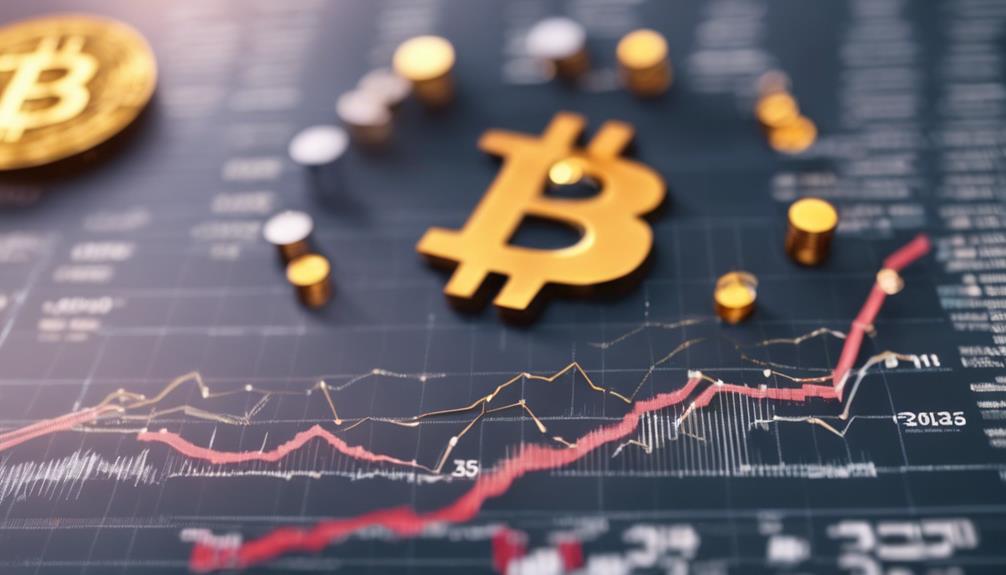Global economic events have a significant impact on Bitcoin prices. Factors such as financial crises influencing investor behavior, high inflation driving Bitcoin adoption as a safe haven, and the recent increase in demand due to the COVID-19 pandemic greatly affect its value. Moreover, regulatory news directly affects Bitcoin prices, with positive developments often causing price spikes. It is important to note that inflation, interest rates, geopolitical events, and institutional interest also play crucial roles in determining the value of Bitcoin. Recognizing these relationships can offer valuable insights into how the global economy influences Bitcoin prices.
Key Takeaways
- Global financial crises influence investor behavior towards Bitcoin.
- Inflation and interest rates affect the valuation of Bitcoin.
- Geopolitical events can lead to fluctuations in Bitcoin prices.
- Regulatory news significantly impacts the value of Bitcoin.
- Institutional interest and adoption drive the value of Bitcoin.
Economic Events Impact on Bitcoin Prices

When economic events occur, they directly impact Bitcoin prices by influencing investor behavior. For example, during times of global financial crises or high inflation, investors often turn to Bitcoin as a safe-haven asset. The COVID-19 pandemic highlighted this trend, leading to increased demand for Bitcoin as individuals sought refuge from economic uncertainty. Regulatory news also plays a significant role in shaping Bitcoin prices; positive developments, like El Salvador adopting Bitcoin as legal tender, can lead to price increases, while negative regulatory events may cause market sentiment to sour.
Understanding how economic events affect Bitcoin prices is essential for investors looking to navigate the cryptocurrency market successfully. By staying informed about global economic trends, regulatory changes, and financial crises, individuals can make more informed decisions regarding their Bitcoin investments. Keeping a close eye on these factors can help investors anticipate price movements and adjust their strategies accordingly.
Global Factors Influencing Bitcoin Prices

Influencing Bitcoin prices on a global scale are various factors such as inflation, interest rates, geopolitical events, regulations, institutional interest, scarcity due to halving events, and market sentiment.
In the economic domain, inflation and interest rates play a vital role in determining the value of Bitcoin within the global financial landscape. Geopolitical events and regulatory news also wield significant influence, shaping the adoption and overall perception of the cryptocurrency.
Importantly, the increasing institutional interest in Bitcoin as a hedge against inflation has been a key driver in recent times. The scarcity of Bitcoin resulting from halving events further contributes to its long-term value proposition.
Additionally, market sentiment and investor behavior are pivotal in driving Bitcoin price dynamics, with fluctuations often reflecting shifts in sentiment and behavior within the cryptocurrency market. Understanding these global factors is essential for comprehending the intricate relationship between the broader economic environment and the valuation of Bitcoin.
Bitcoin Price Dynamics and Economic Events

Understanding how economic events impact Bitcoin price dynamics is essential for maneuvering the cryptocurrency market successfully. Market participants closely monitor global economic events as they play a significant role in shaping Bitcoin's price movements. Regulatory news, financial crises, and shifts in investor attitudes towards Bitcoin as a safe-haven asset all contribute to the volatility in the digital currency market.
| Events | Bitcoin Price Dynamics | Global Economic Events |
|---|---|---|
| Regulatory News | Impact Bitcoin Prices | Influence Market Trends |
| Financial Crises | Shape Price Movements | Reflect Global Conditions |
| Safe-Haven Asset | Alters Investor Attitudes | Respond to Uncertainty |
| Market Participants | Monitor Economic Events | Navigate Price Volatility |
As Bitcoin continues to establish itself within the financial landscape, understanding the intricate relationship between economic events and Bitcoin price dynamics becomes increasingly important for investors looking to make informed decisions in the ever-evolving cryptocurrency market.
Notable Economic Events and Bitcoin Prices

During the recent surge in Bitcoin prices, notable economic events have played a pivotal role in shaping the cryptocurrency market landscape. The COVID-19 pandemic highlighted Bitcoin's appeal as a safe-haven asset, driving increased demand. This surge in interest was further amplified by growing institutional adoption and heightened investor confidence in digital assets. Notably, bitcoin’s $100k premarket surge signaled a turning point for mainstream acceptance, sparking widespread media attention and drawing in additional retail investors. Such developments have solidified Bitcoin’s reputation as a viable alternative to traditional investment vehicles in times of economic uncertainty.
Government regulations wield significant influence over Bitcoin prices, impacting investor sentiment. For instance, El Salvador's decision to adopt Bitcoin as legal tender caused price fluctuations. Negative regulatory news can trigger sharp declines in Bitcoin prices, reflecting the market's sensitivity to such announcements.
Additionally, historical financial crises have historically molded Bitcoin prices, underscoring its role as an alternative financial system during turbulent times. These global economic events underscore the intricate relationship between external factors and the value of Bitcoin, showcasing its susceptibility to both positive and negative impacts from regulatory and financial landscapes.
2024 Bitcoin Halving and Global Economy

Amidst notable economic events shaping Bitcoin prices, the importance of Bitcoin halving on the global economy is an essential aspect to take into account. Bitcoin halving events, occurring approximately every four years, reduce block rewards by half to control inflation and guarantee scarcity.
Post-halving, Bitcoin's price typically experiences upward momentum due to the reduced supply and increased demand that ensue. These halving events often coincide with global economic uncertainties, prompting investors to turn to Bitcoin as a hedge against traditional markets.
Countries facing economic instability frequently witness heightened interest in Bitcoin post-halving as a store of value and alternative investment. Additionally, the regulatory environments following halving events can have a significant impact on Bitcoin adoption and investment sentiment, consequently affecting its price dynamics.
Understanding the interplay between Bitcoin halving and the broader global economic landscape is important for grasping the intricacies of how this cryptocurrency operates within the fluctuating dynamics of the financial world.
Frequently Asked Questions
What Events Affect the Price of Bitcoin?
Events like government regulations, market demand, and technological advancements impact Bitcoin prices. Regulatory changes, like bans or approvals, can lead to price fluctuations.
Market sentiment and adoption rates also play a role. Technological upgrades or security breaches can affect investor confidence.
Understanding these factors can help you navigate the volatile landscape of Bitcoin investments. Stay informed and adapt to market dynamics to make informed decisions regarding Bitcoin prices.
How Will Halving Affect Bitcoin Prices?
Halving events in Bitcoin occur every four years, decreasing block rewards by half to manage inflation. This process aims to uphold scarcity in the cryptocurrency.
Historically, Bitcoin prices tend to rise post-halving due to reduced supply and heightened demand. The latest halving in May 2020 sparked increased institutional interest and investments in Bitcoin.
These events impact mining profitability and can shape long-term price trends, setting Bitcoin apart from traditional currencies.
What Will Happen to Bitcoin if Inflation Rises?
If inflation rises, Bitcoin may attract more investors seeking a hedge against depreciating fiat currencies. The fixed supply of 21 million coins positions Bitcoin as a store of value during inflationary periods.
Increased demand for the digital asset could drive prices up, reflecting its scarcity and decentralized characteristics. Investors might view Bitcoin as a safe-haven asset amidst economic uncertainties, potentially leading to price appreciation.
How Does Macroeconomics Affect Crypto?
Macroecomonics has a substantial impact on crypto by shaping its value, demand, and investor sentiment. Factors like inflation, interest rates, and government policies influence Bitcoin's perception and adoption.
Geopolitical events and regulatory changes also play a vital role. Institutional interest in Bitcoin as an inflation hedge is increasing. Understanding these connections is key to grasping how macroeconomics influences the crypto market.
Conclusion
In summary, the impact of global economic events on Bitcoin prices is similar to a rollercoaster ride, with sudden drops and unexpected turns.
Understanding the dynamics between economic factors and cryptocurrency values is essential for investors and enthusiasts alike.
Stay informed, analyze trends, and brace yourself for the fluctuations that lie ahead.
Just like a skilled surfer maneuvering through turbulent waves, adaptability and knowledge will be your best allies in the world of Bitcoin investments.









